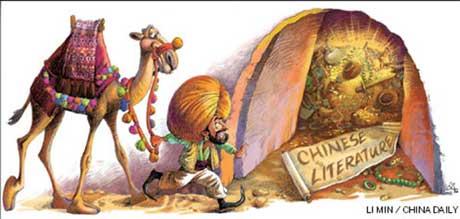Best of times for Chinese books?
2010-04-23 10:02 BJT
BEIJING, April 23 -- Opinion is divided on the state of contemporary literature.
Chinese writers are enjoying the best time for writing and living, declared former Culture Minister Wang Meng in a speech at the Frankfurt Book Fair last October.
 |
He said that the country now has some 100 literary journals and that more than 1,000 novels are published each year.
"Works by writers who were once severely criticized, such as Liang Shiqiu and Eileen Chang, are not only published, but also bestsellers," Wang said.
The veteran writer probably never expected his optimistic evaluation of the state of Chinese literature to cause such a stir among both literary insiders and readers.
A dozen noted Chinese literary critics have published articles or voiced their concern in media reports, and the debate has evolved from the original dispute over whether or not Chinese literature is enjoying a golden age, to an evaluation of contemporary Chinese literature, and more importantly, the reasons behind the controversy.
A similar debate occurred a few years ago, after German Sinologist Wolfgang Kubin called the works of "pretty girl writers", such as Mian Mian and Wei Hui, "trash".
"The Chinese novelist is an utter ignoramus: He has no literary culture, no mastery of his language, doesn't know a word of English, and hasn't the slightest knowledge of foreign literature," said Kubin in an interview with the French magazine, Books.
Many literary insiders took issue with Kubin. British literary translator Nicky Harman, for example, disputes Kubin's view.
"[Chinese writer] Han Dong writes in his blog knowledgeably about Garcia Marquez, Murakami and Kafka And I defy anyone to say that Han Dong and many others like him don't write beautifully in Chinese," she wrote on the Chinese literature website, paper-republic.org.
But many readers seem to share Kubin's criticism. In a recent survey conducted by ifeng.com, 89.9 percent of the 4,242 responding netizens disagreed with Wang's optimism and expressed dissatisfaction with current literary works.
And like their foreign counterparts, domestic literary insiders are divided in their opinions.
Peking University literature professor Chen Xiaoming and Tsinghua University aesthetics professor Xiao Ying have been the leaders of two opposing camps involving a dozen university professors, literary researchers and critics.
Agreeing with Wang that Chinese literature is doing well, Chen highlights the native Chinese cultural experience and the special features of the Chinese language, while recognizing foreign literature as a vital and complementary inspiration.
He cites four writers and their works in his defense: The Joy of Living (Shou Huo, 2003) by Yan Lianke, Qin Opera (Qin Qiang, 2005) by Jia Pingwa, A Sentence is Worth Thousands (Yi Ju Ding Yiwan Ju, 2009) by Liu Zhenyun, and Life and Death are Wearing Me Out (Sheng Si Pi lao, 2006) by Mo Yan.

 Mail
Mail Share
Share Print
Print


 Video
Video









 2009 China Central Television. All Rights Reserved
2009 China Central Television. All Rights Reserved